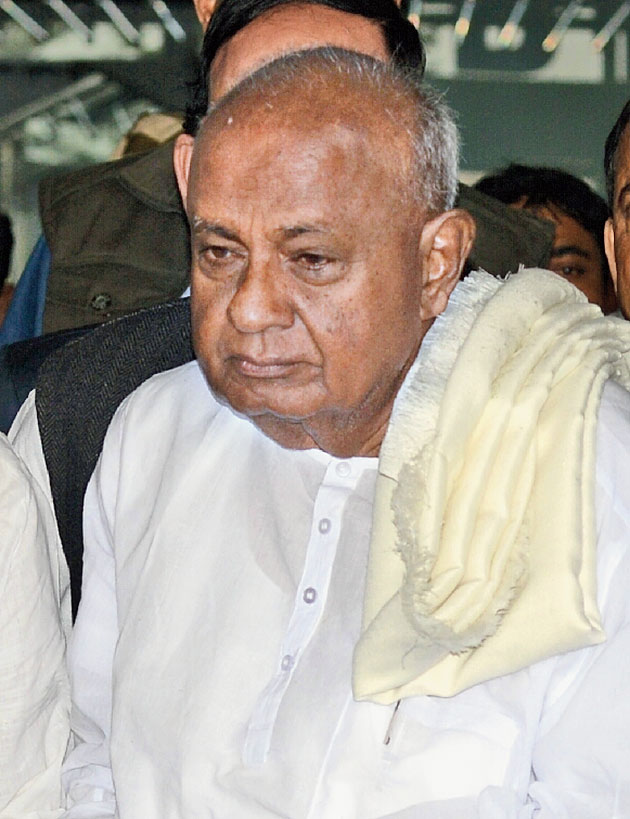Former Prime Minister H.D. Deve Gowda has girded up for one more innings in Parliament, this time getting elected unopposed to the Rajya Sabha with the help of the Congress.
What seemed a distant dream after he lost last year’s Lok Sabha polls has now become a smooth ride for the Vokkaliga strongman with Congress president Sonia Gandhi backing the 87-year-old.
Gowda had last hinted that he wanted to retire from active politics after losing to the BJP’s G.S. Basavaraj from Tumkur in Karnataka. But sources in his Janata Dal Secular said Gowda did not decline the offer Sonia made during a videoconference after the elections to the Upper House were notified.
Gowda will be 93 when he completes his six-year term in 2026.
While the polling was due on June 19, the returning officer late on Friday announced that Gowda, Congress veteran Mallikarjuna Kharge and the BJP’s Ashok Gasti and Iranna Kadadi had all been elected unopposed from Karnataka.
They replace B.K. Hariprasad and Rajeev Gowda of the Congress, Prabhakar Kore of the BJP and Kupendra Reddy of the JDS, all of whom have completed their terms.
Deve Gowda couldn’t have won without the help of the Congress since the JDS has only 34 seats in the Assembly. While the ruling BJP has 117 seats, including the Speaker, the Congress has 68, the Bahujan Samaj Party one, two Independents, two vacancies and one nominated member.
Since 45 seats were required to win a Rajya Sabha berth, Deve Gowda would have fallen short by 11. With the Congress pledging to transfer 11 votes after getting one of its candidates elected had there been an election, Gowda made it unopposed.
Gowda could not be reached for comments despite several attempts. An aide said the veteran leader was busy in meetings.
A leader who has contested every Lok Sabha poll since 1991, barring 1996, Gowda had lost in last year’s general election. It was a gamble that only partly paid off since he had then left his pocket borough Hassan to his grandson Prajwal Revanna, who managed to defeat the BJP’s A. Manju.
The election of Gowda has become a sign of renewed bonhomie between the Congress and the JDS, whose relations had soured after the collapse of their coalition government in July last year.
“This couldn’t have come at a better time as it’s the beginning of an alliance to build a secular political front,” senior JDS leader Y.S.V. Datta told The Telegraph on Saturday.
“Gowda enjoys a very good relationship with the Congress president and his return to the Rajya Sabha would definitely strengthen the secular alliance in Parliament as well. During his days as Prime Minister, he had kept all secular leaders very close,” Datta said.
When the 1996 Lok Sabha polls threw up a hung House, the United Front had surprised everyone by picking Gowda, then the chief minister of Karnataka, to lead the government. After handing over the reigns of the state to J.H. Patel, Gowda had become a Rajya Sabha member.
Gowda led the United Front government for 11 months.
“The election of Gowda with the help of the Congress has also ended talks about the JDS thinking of another alliance with the BJP,” Datta said.
Karnataka Congress spokesman V.S. Ugrappa told this newspaper that Gowda and Kharge would be able to provide a new thrust for a secular alliance.
“I don’t know when or how it will happen since the high command decides national alliances. But I am confident that these two senior leaders from Karnataka will make a big difference in the Upper House,” Ugrappa said.
“All of us are in agreement that the country needs a secular alliance to take on the BJP. The Congress, Mamata Banerjee, the CPM, the CPI and others can be natural partners,” he added.
But Ugrappa wasn’t willing to speculate on the immediate impact of Gowda’s election in Karnataka. “In the long run, the secular alliance could work in Karnataka if the JDS is willing to work with the Congress. But right now there won’t be much of a difference,” he said.
The grassroots of the two parties had not gelled well even when they ran the coalition headed by Gowda’s son H.D. Kumaraswamy.










